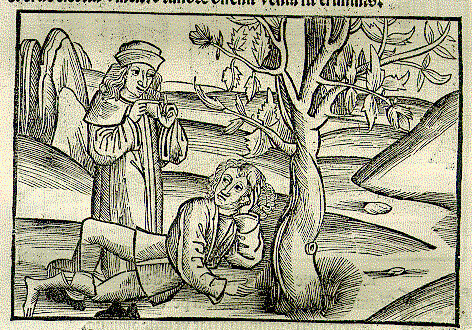HODIE: ante diem quintum Nonas Maias.
GOOGLE BOOKS: Today's Google Books are Lubrano's Suaviludia Musarum and Gouvea's Epigrammata.
MYTHS and LEGENDS: The art image for today's legend shows Heracles and the Lion; you can also see the legends for the current week listed together here.

TODAY'S DISTICHS and EMBLEMS: All the distichs come with vocabulary lists!
RHYMING DISTICHS: The two new Rhyming Distichs are Quisque suo Marte, Quisque suo Marte, sic quilibet utitur arte, / Quam sibi sors dedit, hac utitur omnis homo; and Olim despecti, Olim despecti tenebantur multa loquentes; / Nunc sunt despecti sapientes pauca loquentes.
CATO'S DISTICHS: The two new Cato Distichs are Ereptis opibus, Ereptis opibus, noli maerere dolendo, / Sed gaude potius, tibi si contingat habere; and Contra hominem iustum, Contra hominem iustum prave contendere noli; / Semper enim deus iniustas ulciscitur iras.
MARTIAL'S DISTICHS: The two new Martial Distichs are Non amo te, Non amo te, Sabidi, nec possum dicere quare: / hoc tantum possum dicere, non amo te; and Semicinctium, Det tunicam locuples: ego te praecingere possum; / Essem si locuples, munus utrumque darem.
VERINUS DISTICHS: The two new distichs by Verinus are Qui Habet Maiorem Charitatem, Cui maior caritas, debetur gloria maior; / Quantus amor fuerit, praemia tanta feret; and Virtutis Principium Asperum, Finis Amoenus, Est opus incepto: finis virtutis amoenus, / Principiis quamvis aspera prima via est.
OWEN'S DISTICHS: The two new Owen epigrams, with Harvey's English versions, are Caesaris, Pompeii, et Crassi Sepulchra, Africa Pompeii tellus, Asiaticae Crassi, / Tertia pars mundi Caesaris urna fuit; and Semper Idem, Spes eademque fides sit semper, amorque sit idem, / Ingeniumque tibi sit sibi semper idem.
CAMERARIUS'S EMBLEMS: The two new emblems are Opis Indiga, Stratus humi absentem palmes sterilescit ob ulmum: / Indiget alterius quilibet auxilio; and Exitus In Dubio Est, Sunt dubii eventus incertaque proelia Martis: / Vincitur haud raro, qui prope victor erat.
ROLLENHAGEN'S EMBLEMS: The two new emblems are Discite Iustitiam, Discite iustitiam moniti et non temnere regem, / Qui longas tendit, per loca cuncta, manus; and Non Est Mortale Quod Opto, Munde immunde vale: non est mortale quod opto, / Sidera sublimi vertice summa petam.

TODAY'S MOTTOES and PROVERBS:
TINY MOTTOES: Today's tiny motto is: Semper liber (English: Always free).
3-WORD PROVERBS: Today's 3-word verb-less proverb is Tempus edax rerum (English: Time is the eater of things)
AUDIO PROVERBS: Today's audio Latin proverb is Echinus partum differt (English: The hedgehog postpones its giving birth). To read a brief essay about this proverb and to listen to the audio, visit the Latin Via Proverbs blog.
PUBLILIUS SYRUS: Today's proverb from Publilius Syrus is: Aliena nobis, nostra plus aliis placent (English: We like other people's things more, and others like ours more).
ERASMUS' ANIMALS: Today's animal proverb from Erasmus is Bos lassus fortius figit pedem (English: The ox, when tired, fixes his hoof more firmly; from Adagia 1.1.47).
TODAY'S FABLES and STORIES:
ANECDOTE OF THE DAY: Today's anecdote is Mausolus, the story of the mausoleum of King Mausolus.
FABULAE FACILES WIDGET: The fable from the Fabulae Faciles widget is Mus in Olla, the story of a greedy mouse's demise (this fable has a vocabulary list).
MILLE FABULAE WIDGET: The fable from the Mille Fabulae et Una widget is Asinus et Viatores Duo, the story of two men who found a donkey... and then lost it.
AESOP IN ENGLISH VERSE: Today's fable from the English verse widget is The Dog in The Manger, the famous fable of the snarling dog.
MILLE FABULAE: The "chunk" of Mille Fabulae et Una today is Fable 821, Rusticus et Vox Haedi, through Fable 830, Agricola Sorte Sua Non Contentus, including Rusticus de Arbore Delapsus, which offers some humorous advice about not falling out of a tree: Qui in arborem ascenderat rusticus, de illa delapsus, graviter femur dextrum laesit. Huic alius forte praeteriens se consilium daturum dixit, quo usus numquam de arbore caderet. “Utinam,” inquit ille, “ante casum meum dedisses, sed profuerit tamen etiam in posterum; dic igitur.” Tum ille alter “Cave,” inquit, “ne velocius terram repetas unde ascendisti quam in arborem ipsam evaseris.” Fabula docet saepe cunctationem et moram esse laudabile.
